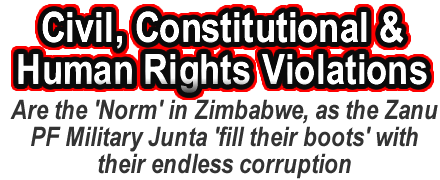 The Gukurahundi Genocide of 1983 to 1987 in Zimbabwe began with a desire and also a design by Robert Mugabe and his ZANU PF political party for one-party state rule and life presidency. For all that to be achieved Joshua Nkomo and ZAPU had to be eliminated.
The Gukurahundi Genocide of 1983 to 1987 in Zimbabwe began with a desire and also a design by Robert Mugabe and his ZANU PF political party for one-party state rule and life presidency. For all that to be achieved Joshua Nkomo and ZAPU had to be eliminated.
“ Nkomo and his guerillas are germs in the country’s wounds and they have to be cleaned up with iodine” - Edgar Tekere ( ZANU PF stalwart)
Following Zimbabwe’s independence from British rule in 1980, political tension increased between two political groups in Zimbabwe, namely the ruling African National Union (ZANU), led by Robert Mugabe, and the Zimbabwe African People’s Union (ZAPU), led by Joshua Nkomo. Violence unleashed on the Ndebele people by the Mugabe-led government was a direct result of government efforts to silence the voices of minority groups and growing political critique from ZAPU.
In January 1983, the ZANU PF government of Robert Mugabe, in the newly independent Zimbabwe, launched a massive security clampdown on the Ndebele. This was both politically and ethnically motivated. At the heart of the operation was a strategy of state-ordered terror. It was perpetrated by a 4,000-strong all-Shona Fifth Brigade of the Zimbabwean National Army led by Perrance Shiri.
Although they both fought against white rule, and although Nkomo was minister of Home Affairs under Mugabe, both men distrusted each other. In 1982, Mugabe fired Nkomo, accusing him of plotting a coup to overthrow the newly independent country’s government, and promised to root out his supporters from positions of influence.
ZANU PF decided to say there were 'no go' areas, there were certain areas in the country where they would not allow a political party to participate in… These areas were where ZANLA forces had had a strong presence. ZAPU believed that would not be allowed. Nkomo actually made a very strong protest to Lord Staines to say that we can’t call that a free and fair election where you have one party refusing people to come and campaign in the areas where their forces are.
The Fifth Brigade, however, not only attacked ZAPU members, it also targeted civilians in mass numbers, and at random, including women and children. People were executed in public squares after digging their own graves or marched into buildings and burned alive.
Mugabe and ZANU PF created a “one party mantra” that was strong and brooked, no debate or opposition. Any individual or organisation in Zimbabwe that gestured towards multi-party democracy became an enemy that could not only be called names but was supposed to be eliminated from the political landscape. Instead of understanding Nkomo as a legitimate political opponent whose rights were to be guaranteed, Mugabe took him as a “self-appointed Ndebele king” who needed to be “crushed”.
The reduction of Nkomo to a self-styled king was at once a political insult and an effective metaphor that was meant to reduce an opposition leader from the nation of Zimbabwe to his tribe; the Ndebele, it was to expel home from national politics to the village.
Although the government has never officially acknowledged the killings, and has denied there was a genocide, some attempts were made by Mugabe’s government to investigate.
Some in survivor communities say they have little hope in the exercise, primarily because Mnangagwa is himself implicated in the killings because he was the Minister of State for National Security between 1980 and 1988. That encompasses the period during which the Gukurahundi massacres occurred. Mnangagwa has repeatedly denied allegations of involvement in the past.
Zimbabwe, under both Mugabe and Mnangagwa, has a long history of human rights violations and discrimination.
 Mnangagwa had oversight over both the army’s Fifth Brigade and the Central Intelligence Organisation in his role as Minister of Internal Security and Chairman of Zimbabwe’s Joint High Command. He reported directly to Mugabe.
Mnangagwa had oversight over both the army’s Fifth Brigade and the Central Intelligence Organisation in his role as Minister of Internal Security and Chairman of Zimbabwe’s Joint High Command. He reported directly to Mugabe.
Four decades later, however, justice and accountability for the massacres can still be achieved. During the massacres, the Ndebele people of the Matebeleland and Midlands regions were devastated by violence. In addition to killings, many people were subjected to torture, degrading and inhuman treatment, rape, and sexual violence.
Impunity and lack of accountability have remained a constant in Zimbabwe, and for many it is apparent that the current repressive tactics of the state and the compromised judiciary do not bode well for justice and accountability for the massacres, now or in the future.
Gukurahundi was worse than the Nazi Holocaust. So those responsible need to face their fate. They need to be executed. No wonder they only teach us about characters like Napoleon Bonaparte and Adolf Hitler in schools, which is their scapegoat from the devastating evil actions they did. Why do they avoid the topic of Gukurahundi, because they know what they did decades ago.


